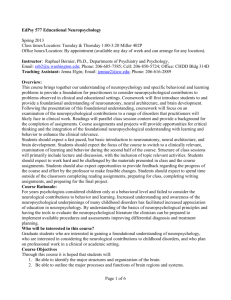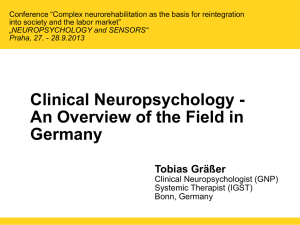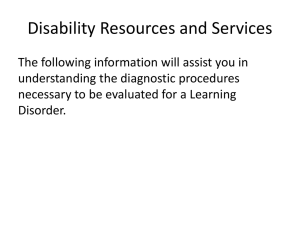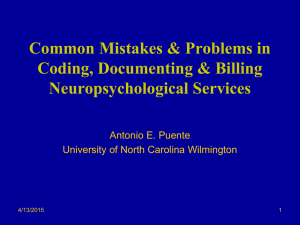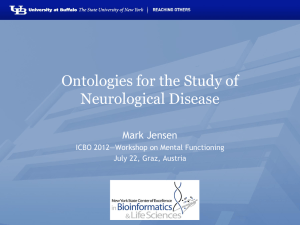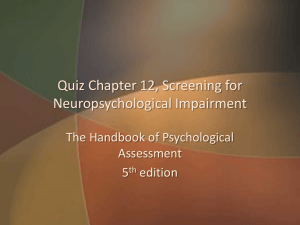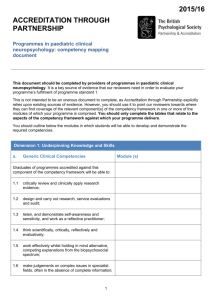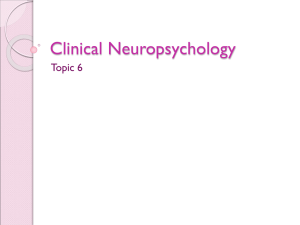Competency mapping document - adult clinical neuropsychology
advertisement
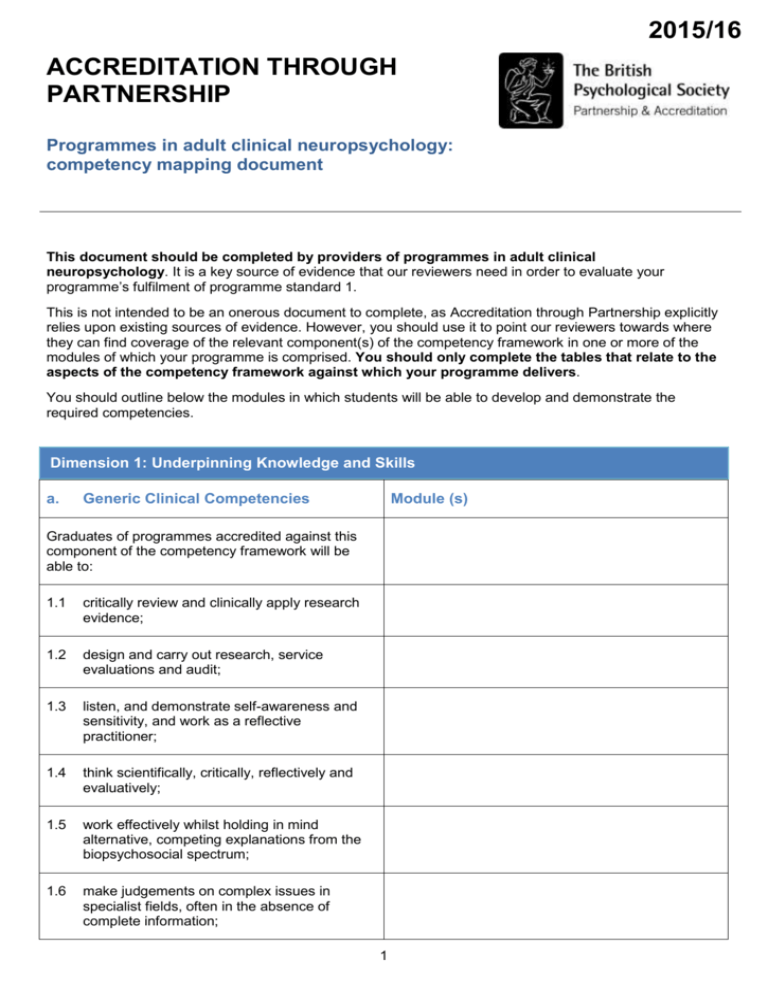
2015/16 ACCREDITATION THROUGH PARTNERSHIP Programmes in adult clinical neuropsychology: competency mapping document This document should be completed by providers of programmes in adult clinical neuropsychology. It is a key source of evidence that our reviewers need in order to evaluate your programme’s fulfilment of programme standard 1. This is not intended to be an onerous document to complete, as Accreditation through Partnership explicitly relies upon existing sources of evidence. However, you should use it to point our reviewers towards where they can find coverage of the relevant component(s) of the competency framework in one or more of the modules of which your programme is comprised. You should only complete the tables that relate to the aspects of the competency framework against which your programme delivers. You should outline below the modules in which students will be able to develop and demonstrate the required competencies. Dimension 1: Underpinning Knowledge and Skills a. Generic Clinical Competencies Module (s) Graduates of programmes accredited against this component of the competency framework will be able to: 1.1 critically review and clinically apply research evidence; 1.2 design and carry out research, service evaluations and audit; 1.3 listen, and demonstrate self-awareness and sensitivity, and work as a reflective practitioner; 1.4 think scientifically, critically, reflectively and evaluatively; 1.5 work effectively whilst holding in mind alternative, competing explanations from the biopsychosocial spectrum; 1.6 make judgements on complex issues in specialist fields, often in the absence of complete information; 1 1.7 exercise personal responsibility and largely autonomous initiative in complex and unpredictable situations; and 1.8 generalise and synthesise prior knowledge and experience in order to apply it critically and creatively in different settings and novel situations. They will also demonstrate an understanding of: 1.9 the supervision process for supervisee and supervisor roles, and be able to provide supervision at an appropriate level within their own sphere of competence; 1.10 relevant psychological theory, including: knowledge of biological psychology, human performance, health psychology, behavioural psychology, disability issues and adjustment models; and detailed knowledge of current models of normal cognitive function to facilitate an understanding of the approaches, models and findings of cognitive neuropsychology, together with their clinical implications; and 1.11 theories and models of leadership and change processes, and their application to service development and delivery. b. Neuropsychological Competencies Module (s) Graduates of programmes accredited against this component of the competency framework will demonstrate an understanding of the following: 1.12 Knowledge of the fundamental principles underpinning neuroscience, including understanding the general principles of neuroanatomy, elementary neurophysiology, elementary neurochemistry and developmental neuroscience. Sufficient knowledge of the basic principles of neuroscience should be demonstrated for four purposes: (i) to enable understanding of the neuroscience literature as it pertains to neuropsychological issues; (ii) to facilitate understanding of communications from colleagues working 2 in allied disciplines; (iii) to appreciate the medical evidence as it relates to a particular client; and (iv) to contribute to relevant discussions about the care, management and rehabilitation of particular clients. As important as this general knowledge is the ability to access sources of more detailed information which may be required in considering the case of an individual client. 1.13 Knowledge of normal aging, brain pathology/injury and neurological recovery, including understanding of: plasticity in development and in response to trauma and other injuries; categories of neuropathology; demyelinating white matter disease; metabolic changes in response to neuropathology and metabolic conditions; neurotoxic process; effects of raised CNS pressure and hydrocephalus; infectious disease; monophasic and biphasic processes; acute/primary and post-acute/secondary effects; traumatic brain injury; and degenerative conditions. 1.14 Knowledge of conceptual approaches adopted in clinical neuropsychology and their historical foundations, including: localisation of function; behavioural neurology; normative approaches; lateral asymmetries; cognitive neuropsychology (including contemporary models/theories of attention, information processing, executive function, visual/perceptual frameworks etc.); functional decomposition; single case studies; and single and double dissociations. 1.15 Knowledge of contemporary theories of brain/behaviour relationships and their implications for clinical practice, including: knowledge of the relationship between brain 3 areas and likely behavioural/cognitive outcomes; and knowledge regarding the relationship between brain pathology, performance on neuropsychological assessments and functional abilities. 1.16 Understand psychometric and statistical principles. Knowledge of psychometric principles may include the following, for example: understanding the purpose of expressing test scores using a common metric; understanding the most commonly used standard metrics (z scores, T scores, Standard Wechsler scores, IQ scores, Sten scores, Percentile Ranks); understanding the meaning and limitations of age-equivalent scores; understanding the distinction between absolute levels of functioning and scores referenced to age norms; understanding how to convert scores on one metric to another; understanding the concept of standard error of measurement and how it is calculated; understanding how one can determine whether test scores are reliably different; understanding of the processes for distinguishing normal and abnormal trajectories of cognitive development; understanding the importance of the distinction between the reliability and abnormality of test score differences; understanding the base rate issue when multiple tests are employed; understanding the factors influencing attempts to measure change in test performance; understanding the use of regression in measuring change in the individual case (including interpretation of change in test scores taken at different chronological ages); 4 understanding of the relative value of different sources of validity information in diagnostic testing; understanding the sensitivity and specificity of tests; and/or understanding the role of base rates and the use of Bayes’ theorem in diagnostic testing. 1.17 Knowledge of methods, terminology and conceptual approaches of the clinical medical disciplines allied to clinical neuropsychology, including: basic neuroanatomy (see competency 1.13); neuropathology (see competency 1.13); neuroradiology; principles of neurology; the neurological examination; neurosurgical procedures; neuropharmacology; paediatric neurology; electrophysiology; and allied clinical disciplines (speech and language therapy; physiotherapy; occupational therapy; rehabilitation medicine; nursing). 1.18 Knowledge of advances in neuroscience research/practice and its implications for neuropsychological theory/practice, including an awareness of: the general principles of new advances in neuroscience research; conceptual developments concerning the organisation and functional operation of the human nervous system; and their implications for neuropsychological theory and practice. 1.19 Knowledge of contemporary models/frameworks of health, disability and participation, for example, the International Classification of Functioning, Disability and Health [ICF], (World Health Organisation, 2001). 1.20 Knowledge of all aspects of common neuropsychological, neurological and neuropsychiatric conditions. Graduates must be able to provide evidence of substantial knowledge concerning all aspects of common neuropsychological disorders, as 5 follows: (a) Disorders of language neurolinguistics the aphasias alexia and agraphia acalculia (b) Disorders of perception and cognition sensory perception body schema disorders object recognition visual perception the agnosias: colour, face, object somaesthesias (c) Disorders of attention attention and its components neglect (d) Sensorimotor disorders somatosensory processes the apraxias astereognosis (e) Disorders of executive function disorders of organisation, planning, reasoning conceptual dysfunction, problem solving (f) Disorders of memory and learning semantic memory implicit memory the amnesic syndrome anterograde and retrograde amnesia; PTA specific memory loss (g) Disorders of emotion and social behaviour affective disturbances disorders of motivation and initiation disinhibition, aggression and asocial behaviour anhedonia (h) Severe and profound brain injury coma, low awareness and vegetative states 6 (i) Neuropsychology of degenerative conditions dementia of the Alzheimer type multi-infarct dementia vascular dementia multiple sclerosis Parkinson’s disease Huntington’s disease motor neurone disease AIDS (j) Neuropsychology of acquired brain injury closed traumatic brain injury penetrating traumatic brain injury cerebrovascular disorders alcohol and drug abuse other neurotoxins cerebral anoxia cerebral infections (k) Neuropsychology of neoplastic and systemic disorders neoplastic conditions systemic disease (l) Paediatric neuropsychology congenital disorders developmental disorders neurodevelopmental disorders autism, Asperger’s syndrome acquired brain injury in children (m) Epilepsy and seizure disorders classification of epileptic phenomena neuropsychology of epilepsy course of idiopathic/acquired epilepsy neuropsychological implications of seizure events neuropsychological implications of treatment: surgical/pharmacological non-epileptic seizures 7 Dimension 2: Clinical work a. Generic Clinical Competencies Module (s) Graduates of programmes accredited against this component of the competency framework will be able to: 2.1 develop and sustain professional relationships; 2.2 work effectively in multi-disciplinary teams; 2.3 work effectively with formal service systems and procedures; 2.4 adapt practice to a range of organisational contexts, on the basis of an understanding of pertinent organisational and cultural issues; 2.5 choose, use and interpret a broad range of assessment methods appropriate to the client and service delivery system in which the assessment takes place and to the type of intervention which is likely to be required (including assessment of mental health, cognitive function, the cognitive abilities underpinning driving, and capacity etc.); 2.6 decide, using a broad evidence and knowledge base, how to assess, formulate and intervene psychologically, from a range of possible models and modes of intervention with clients, carers and service systems; 2.7 develop formulations which integrate information from assessments within a coherent framework that draws upon psychological and neuropsychological theory; 2.8 direct, co-ordinate, support or facilitate teams together with an understanding of the principles of operation within a multidisciplinary or management team; 2.9 recognise when (further) intervention is inappropriate, or unlikely to be helpful, and communicate this sensitively; and 2.10 select and implement appropriate methods to evaluate the effectiveness, acceptability and broader impact of interventions at a service and organisational level, and using this information to inform and shape practice and 8 service development. Where appropriate this will also involve devising innovative procedures. They will also demonstrate knowledge of: 2.11 factors which must be considered in selecting an intervention and knowledge of barriers to intervention; and 2.12 procedures by which the progress of and outcomes from an intervention may be assessed at the client level [individuals, groups and families]. b. Neuropsychological Competencies Module (s) Graduates of programmes accredited against this component of the competency framework will demonstrate the following: 2.13 Ability to demonstrate a holistic understanding of the social, psychological, cognitive and vocational impact of acquired brain injury and neurological conditions both for individuals and systems, which may include, for example, understanding: (i) the prevalence of behaviour problems after acquired brain injury/neurological impairment; (ii) the range of factors that may contribute to the development of behaviour problems after acquired brain injury/neurological impairment; (iii) how to assess problems of anger and aggression after acquired brain injury/neurological impairment; (iv) the evidence base relating to the main approaches to the management of anger and aggression including pharmacological, psychological therapy and behaviour management approaches; (v) the most common psychosocial consequences of acquired brain injury/neurological impairment including changes in personality and psychiatric disorders; and/or (vi) the impact of acquired brain injury/neurological conditions on family functioning, personal, work and social relationships and community participation. 9 2.14 Ability to identify cognitive impairment, behavioural changes and emotional difficulties and provide integrated psychological/ neuropsychological approaches to manage these. 2.15 Ability to understand structural organisation of neurorehabilitation services and the role of clinical neuropsychology within these services. Graduates must understand: (i) the principles of operation within a multidisciplinary rehabilitation or management team; (ii) the role of a clinical neuropsychologist if required to direct, co-ordinate, support or facilitate such a multidisciplinary team; (iii) what might comprise a model neurorehabilitation service; and (iv) the role of clinical neuropsychology within such a service. Neuropsychological assessment competencies 2.16 Ability to use behavioural observations and to map them to possible neurological, cognitive or emotional underpinnings. 2.17 Ability to perform clinical assessment including history taking, bedside cognitive assessment and mental status examination and carrying this through to management. 2.18 Ability to tailor neuropsychological assessment to clients and to address appropriate questions. 2.19 Ability to demonstrate familiarity with and select, administer and interpret a wide range of assessment instruments. Familiarity with assessment instruments must include: (i) the general nature of the test instrument and its theoretical foundation; (ii) its development, standardisation and psychometric properties; (iii) the procedures for its application, scoring and interpretation; and (iv) an ability to derive and report valid conclusions from the application of the 10 test. Graduates must not only be familiar, in some depth, with a range of the most commonly employed procedures, but also should possess a more general appreciation of the wider range of tests which might appropriately be employed. They should: (i) be able to select instruments which are capable of providing valid and pertinent information relevant to the neuropsychological investigation, and be able to appreciate the limitations of the information so derived. (ii) have an understanding about assessment of change over time and issues related to repeat assessment and monitoring progress/progression. 2.20 Ability to understand psychometric principles underpinning the selection, administration and interpretation of cognitive test scores. Graduates must provide evidence of a thorough and comprehensive knowledge of the assessment procedures adopted in clinical neuropsychology. They should already possess a sound knowledge of psychometric and statistical principles (see competency 1.16) and must in addition be familiar with an adequate range of the assessment instruments employed in general clinical neuropsychological practice. 2.21 Ability to describe the range of factors that could affect performance on neuropsychological tests. Graduates must be able to interpret cognitive tests scores in the context of a broader well-structured investigation and consider the impact of additional variables that could affect performance on cognitive test scores (for example, fatigue, sleep, mood, anxiety, effort, time of day, sensory/motor problems, cultural biases, normal aging, bilingualism, diversity etc.). 2.22 Working knowledge regarding the neuropsychological profiles associated with a range of common neuropsychological disorders. Graduates must have knowledge of the neuropsychological profiles associated with a range of common neuropsychological disorders which are outlined in competency 1.20. 11 Neuropsychological formulation competencies 2.23 Ability to construct formulations about the client’s neuropsychological status by the deductive process of cognitive assessment in the course of a broader investigation. Graduates must demonstrate the ability to reason neuropsychologically on the basis of a variety of sources of assessment data and provide a psychological description based upon complex neuropsychological data. 2.24 Ability to use neuropsychological formulations dynamically to facilitate a client’s understanding and adjustment, and to plan interventions if required, coupled with the ability to revise formulations when necessary. This should include: (i) using formulations with clients to facilitate their understanding of their own experience; (ii) using neuropsychological formulations to plan appropriate interventions that take the client’s perspective into account; and (iii) revising formulations in the light of ongoing intervention and when necessary reformulating the problem. Neuropsychological competencies in Rehabilitation and Intervention 2.25 Ability to use formulation and devise and deliver evidence based and individually tailored psychological and or neuropsychological interventions with clients and/or systems. This should include: (i) on the basis of a formulation, implementing neuropsychological, psychological therapy or other interventions appropriate to the presenting problem and to the psychological and social circumstances of the client(s), and to do this in a collaborative manner with: individuals; couples, families or groups and services/organisations; (ii) understanding therapeutic techniques and processes as applied when working with a range of different individuals in distress, including those who experience difficulties related to: anxiety, mood, adjustment to adverse circumstances or life events, eating, psychosis and use of substances, and those with somatoform, 12 psychosexual, developmental, personality, cognitive and neurological presentations; (iii) ability to implement therapeutic interventions based on knowledge and practice in at least two evidence-based models of formal psychological therapy, of which one must be cognitive-behaviour therapy; (iv) understanding social approaches to intervention; for example, those informed by community, critical, and social constructionist perspectives; and (v) implementing interventions and care plans through and with other professions and/or with individuals who are formal (professional) carers for a client, or who care for a client by virtue of family or partnership arrangements. 2.26 Ability to adapt models of therapeutic intervention for psychological difficulty in the context of impaired cognitive functioning. This should include: (i) the ability to critically appraise the rationale for the application of particular models of intervention in the context of impaired cognitive functioning; (ii) an awareness of the challenges to conducting therapeutic interventions in this context, and an understanding of the way in which models of intervention may be adapted to take account of deficits associated with impaired cognitive functioning; and (iii) a critical understanding of the evidence relating to the efficacy of particular models of intervention in the context of impaired cognitive functioning. 2.27 Ability to consider broader psychological interventions appropriate to the presenting ‘neuropsychological’ difficulty and to the psychological and social circumstances of the client(s). 2.28 Applied understanding of the principles of management and rehabilitation of neuropsychological/neurological disorders. Principles of recovery and rehabilitation include: behavioural interventions; cognitive rehabilitation; pharmacological treatments for neuropsychological complaints; vocational 13 rehabilitation; goal planning; personal and social effects of neurological disease; rehabilitation and disability counselling; impact upon relatives and carers; evaluation of outcome; understanding of rehabilitation services; and knowledge of voluntary organisations. Graduates must: (i) exhibit knowledge of the principal theories which pertain to neurological recovery and to neuropsychological rehabilitation; (ii) be able to show a detailed knowledge of the procedures most commonly employed in the management and rehabilitation of clients, from a variety of psychological perspectives; (iii) have a working knowledge of pharmacological treatments for neuropsychological complaints; (iv) show an appreciation of the factors which must be evaluated in selecting an appropriate intervention, and the likely outcomes of the interventions which may appropriately be considered; (v) demonstrate a working knowledge of the procedures which may be employed, and consideration of the factors which determine the precise form which the intervention will take; (vi) demonstrate flexibility in applying general intervention approaches, taking into account basic psychological and neuropsychological principles. 2.29 Ability to use up to date knowledge and understand the treatment approaches and management for a range of common of neuropsychological, neurological and neuropsychiatric conditions. See competency 1.20 for examples of common neuropsychological disorders, neurological and neuropsychiatric disorders. 2.30 Understand the role of clinical neuropsychology within mental health services 14 Dimension 3: Communication a. Generic Clinical Competencies Module (s) Graduates of programmes accredited against this component of the competency framework will be able to: 3.1 prepare and deliver teaching and training which takes into account the needs and goals of the participants; 3.2 demonstrate sound knowledge of the principles of report writing and other aspects of professional communication; 3.3 communicate psychologically-informed ideas and conclusions clearly and effectively to specialist and non-specialist audiences; and 3.4 demonstrate understanding of consultancy models and the contribution of consultancy to practice. b. Neuropsychological Competencies Module (s) Graduates of programmes accredited against this component of the competency framework will demonstrate the following: 3.5 Ability to communicate neuropsychological hypotheses and conclusions clearly and effectively to specialist and non-specialist audiences. 3.6 Ability to adapt style of communication to people with a wide range of neuropsychological disorders with differing levels of cognitive ability, sensory acuity and modes of communication. 3.7 Ability to adapt communication and level of detail used in communication depending on the audience, including the ability to communicate clinical and non-clinical information from a psychological perspective in a style appropriate to a variety of different audiences [for example, to professional colleagues, and to service users and their carers, e.g. by adapting and simplifying reading materials for clients when appropriate]. 15 3.8 Provide (neuro) psychological feedback to clients/systems clearly and sensitively. 3.9 Ability to understand the process of providing expert neuropsychological opinion and advice, including the preparation and presentation of evidence in formal settings. 3.10 Ability to support others’ learning in the application of neuropsychological skills, knowledge, practices and procedures. 3.11 Ability to engage and communicate with assistant psychologists in supervising the effective use of psychometric assessment tools and techniques, behavioural observation and elementary rehabilitation. 3.12 Ability to use neuropsychological formulations to assist multi-professional communication. 3.13 Ability to accommodate medical information from various sources. Dimension 4: Personal and Professional Practice a. Generic Clinical Competencies Module (s) Graduates of programmes accredited against this component of the competency framework will be able to: 4.1 understand ethical issues and apply this knowledge in complex clinical contexts, ensuring that informed consent underpins all contact with clients and research participants; 4.2 manage own personal learning needs and develop strategies for meeting these needs; 4.3 appreciate the power imbalance between practitioners and clients and how abuse of this can be minimised; 4.4 understand the impact and implications of differences, diversity and social inequalities on people’s lives and their implications for working practice, including understanding the process of communicating effectively through 16 interpreters and having an awareness of the limitations thereof; 4.5 understand the impact of one’s own value base, attitudes and behaviour on clinical practice and service users; 4.6 use supervision to reflect on practice, and make appropriate use of feedback received, including the ability to use available expertise and advice from senior colleagues to support ongoing professional development; 4.7 develop strategies to handle the emotional and physical impact of own practice and seek appropriate support when necessary, with good awareness of boundary issues. 4.8 work collaboratively and constructively with fellow psychologists, other colleagues and users of services; 4.9 monitor and maintain the health, safety, and security of self and others; 4.10 work effectively at an appropriate level of autonomy, with awareness of the limits of one’s own competence, and accept accountability to relevant professional and service managers; 4.11 exercise duty of care with regard to safeguarding vulnerable groups; and 4.12 understand the legislative and national planning context of service delivery and clinical practice. b. Neuropsychological Competencies Module (s) Graduates of programmes accredited against this component of the competency framework will be able to: 4.13 Knowledge of formal documents/guidelines in relation to ethical principles of practice, legal and statutory obligations and general professional standards as applied to practice in clinical neuropsychology. This should include: (i) Applied knowledge of general key guidelines and legislation, such as: Mental Capacity Act/ Adults with 17 Incapacity (Scotland); Knowledge of driving guidelines and DVLA procedures; Mental Health Act; Protection of Vulnerable Adults; Deprivation of Liberty Safeguards; Safeguarding Children; and NICE guidlines/ Scottish Intercollegiate Guidelines Network (SIGN). (ii) Knowledge of specific guidelines and policies related to people with acquired brain injury/neurological conditions. For example: National Service Framework for people with long term conditions National Guidelines for Stroke Intelligent Targets for Dementia in Wales 4.14 Knowledge of the political and organisational context of health care delivery as it relates to neuropsychological clients, as well as relevant aspects of NHS and Social Services procedures, including arrangements for community care, support for neurological disability, and care for people who lack capacity. 4.15 Knowledge of the differing requirements for neuropsychology in a range of contexts including private practice. This should include knowledge of the differing requirements for neuropsychological reports in a range of contexts, including medico-legal settings. For example, those undertaking private work should have an understanding of giving evidence in court, testamentary capacity, legal issues impinging on reports, and duty of care, etc. 4.16 Knowledge of general professional issues, and developments in professional arrangements and practice both within a national and an international context, as well as an appreciation in general terms of certain practices and concerns of those professions most closely allied to clinical neuropsychology. 18 Dimension 5: Research Graduates of programmes accredited against this component of the competency framework will be able to: 5.1 Being a critical and effective consumer, interpreter and disseminator of the research evidence base relevant to clinical neuropsychology practice and that of psychological services and interventions more widely. Utilising such research to influence and inform the practice of self and others. 5.2 Conceptualising, designing and conducting independent, original and translational research of a quality to satisfy peer review, contribute to the knowledge base of the discipline, and merit publication including: identifying research questions, demonstrating an understanding of ethical issues, choosing appropriate research methods and analysis (both quantitative and qualitative), reporting outcomes and identifying appropriate pathways for dissemination. 5.3 Understanding the need and value of undertaking translational (applied and applicable) clinical research post-qualification, contributing substantially to the development of theory and practice in clinical neuropsychology. 5.4 The capacity to conduct service evaluation, small N, pilot and feasibility studies and other research which is consistent with the values of both evidence based practice and practice based evidence. 5.5 Conducting research in respectful collaboration with others (e.g. service users, supervisors, other disciplines and collaborators, funders, community groups etc.) and within the ethical and governance frameworks of the Society, the Division, HCPC, universities and other statutory regulators as appropriate. 19
